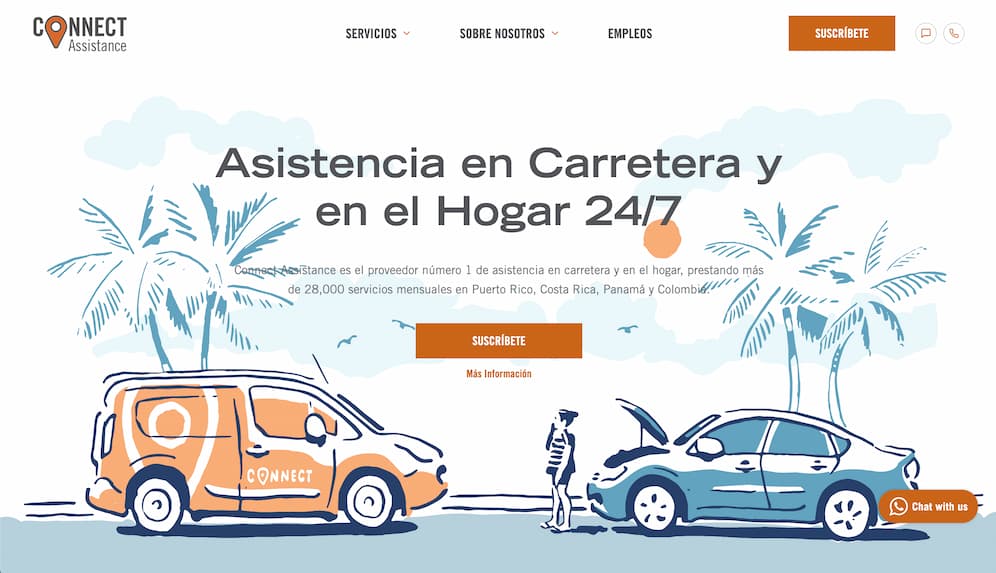Connect Assistance
Full Stack Developer · Nov 2020 - Jun 2023 · 2 yrs 8 mos
In my role as a Backend and Frontend Developer at Connect Assistance, I was responsible for designing and implementing high-quality web systems. I utilized customer-centric innovation to transform roadside, home, and travel assistance into a value-added experience.

Connect Assistance is a 24/7 roadside, travel, concierge and home assistance company
Based in Puerto Rico with branches in Costa Rica, Panama, Colombia and Mexico, this company offers their services through various business and retail channels, including auto distributors, insurance companies, and car rentals, as well as yearly memberships sold through directly to consumers.
Connect Assistance is committed to providing their customers with the best possible experience. They are constantly innovating and looking for ways to improve their services.
My role at Connect Assistance
Backend and Frontend Developer
November 2020 to June 2023 · 2 yrs 8 mos
One of the last projects that I’ve been involved in Connect Assistance was EOS
EOS a b2b platform that presents assistance services to providers and insurers. One of the main features I developed on this platform was the ability to generate payment invoices for suppliers. In other words, providers with access can generate invoices for services that are pending payment. This streamlines the company’s accounting process, as previously suppliers had to go to the company’s office to submit their invoices.
The company have presence in five countries of America, each one with it’s own specific business model. This means that I have developed certain characteristics that adapt to each business model, such as:
- A job for a worker to automatically generate invoices
- Calculation of taxes (each country has its own specific percentage)
Also I am proud to have designed and implemented the feature flag from scratch (I know there are several tools that can do this, but in discussion with my team we decided to develop it ourselves from scratch, in a more minimalistic and adapted way to our needs). It is based on components and pages, related to branch, user type, and role. This allows us to speed up the process of releasing new features to a certain type of user, and also quickly disable components or pages in case of error.
Responsibilities during my work
- Transitioned multiple projects from JavaScript to TypeScript
- Conducted analysis and created interfaces and types to facilitate the transition.
- Configured Mezmo logs for backend applications.
- Implemented unit testing for several processes that are core to the company system.
- Developed feature flags from scratch, utilizing in React components and routes.
- Created a reconciliation script to ensure consistency between PostgreSQL and MongoDB records in a legacy project.
- Implemented collections of configuration records in a NoSQL database:
- Messages: Configuration that establishes acceptance criteria for triggering messages (SMS, WhatsApp, or email) to clients.
- Add-ons: Configuration that establishes acceptance criteria for creating service assistance add-ons.
- Improved and added new features to a system utilized by suppliers, insurers, and accountants. Technologies used include Node.js, Prisma ORM (with Postgres), React, and AWS (S3, SQS).
- Successfully implemented and configured several objects and workflows within Salesforce.
- Observability: Implemented New Relic and Sentry dashboards to monitor and track errors in several systems
Some of the tools I frequently utilized in my day-to-day work
- React, Angular, NodeJS development with Typescript and Serverless
- Relational databases: PostgreSQL with Prisma and Sequelize ORM’s
- No Relational databases: MongoDB with Mongoose
- AWS: S3, SQS, Lambda, AppRunner and Amplify
- Salesforce: workflows and email alerts
- Observability: New Relic, Sentry, Datadog, CloudWatch (AWS) and Mezmo
- Deployment: AWS AppRunner, AWS Amplify, Netlify, Heroku
- CI/CD: GitHub Actions, CircleCI
- Version Control: Git, Github
- Testing: Jest